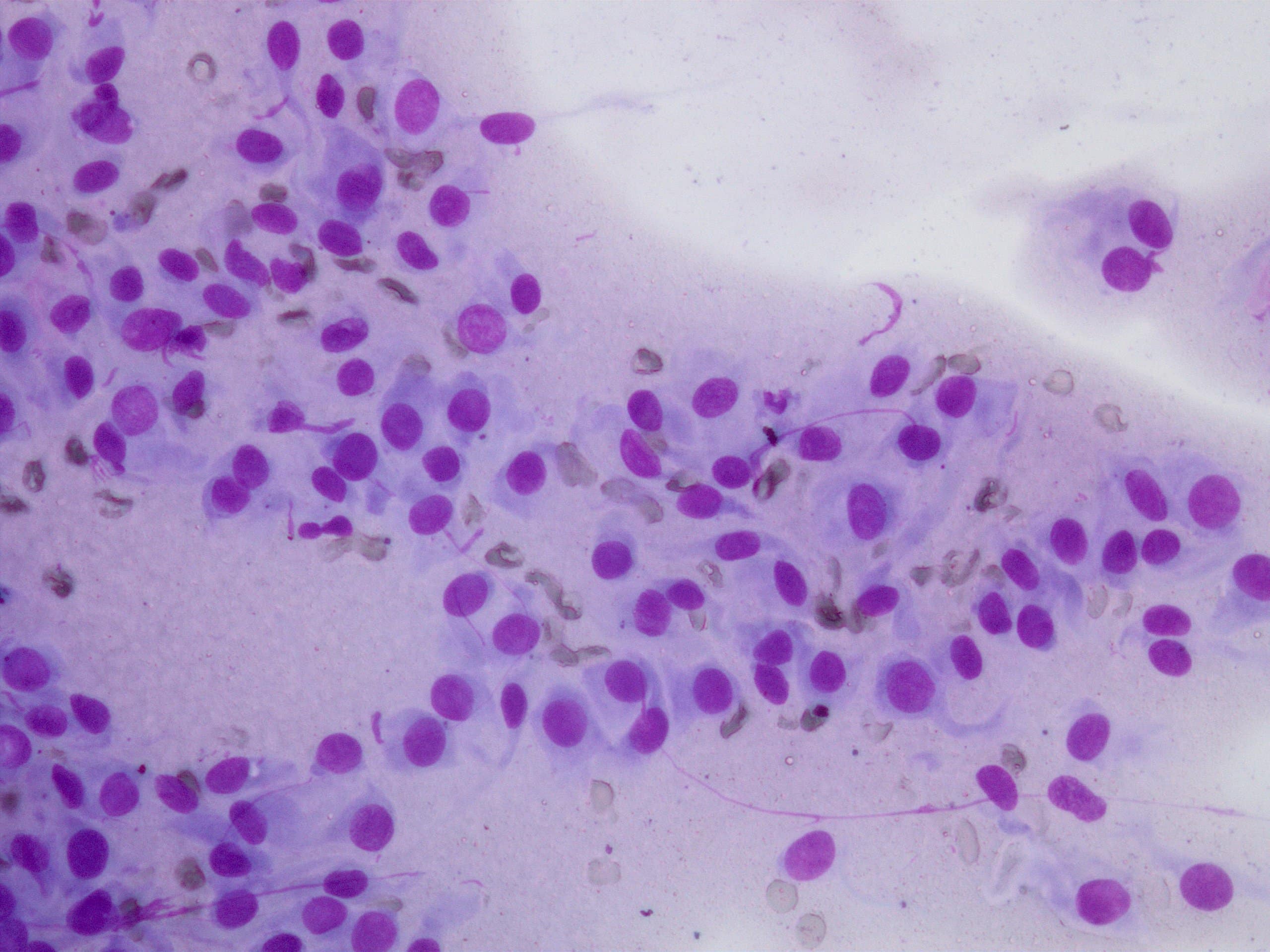Fundamentals of Cytology
24/7 access for the lifetime of this course
Flexible CPD whenever you want it
CPD points: 8
Certificate on completion


Cytology is a widely used and accessible diagnostic tool across all levels of veterinary practice. It can be in-house, quick, inexpensive, and instantly gratifying. Yet the overall value of cytology depends on variables like case selection, sampling technique, specimen handling, and the skill of interpretation.
Are you choosing the right tool for the job?
This four week online series is designed to help you reach a diagnosis through cytology. The course begins with how to identify appropriate lesions… is cytology the right test? Differentiate inflammation from neoplasia, and later in the course, we’ll cover some exceptions to the rules – including sneaky carcinomas which lack features of malignancy.
This course is designed for Vets who enjoy visual learning. We encourage anyone with an interest in pathology to register.
While this CE was created primarily for general practice vets, we warmly welcome veterinary nurses and technicians who wish to build their knowledge and confidence in this area.
Do you struggle with…
- Differentiating inflammatory from neoplastic characteristics?
- Identifying round cells versus spindle cells versus epithelial cells?
- Picking features of malignancy?
- Recognising macrophages?
What if we offered you a solution?
Cytology can sometimes feel like staring at an abstract painting – blurry, confusing, and open to interpretation. Is that inflammation or neoplasia? A friendly macrophage or a troublemaking tumour cell? If you’ve ever squinted at a slide and wished for a little more certainty, you’re not alone.
This course is designed to take the guesswork out of cytology and give you the confidence to tell your spindle cells from your epithelial ones – without second-guessing yourself every step of the way. We’ll walk you through when FNA sampling is actually worth it, how to classify inflammatory and neoplastic cells (yes, even the tricky ones), and what those cytologic features of malignancy really mean.
Through four visually engaging modules, you’ll embark on a journey through round-cell neoplasia, master the mysterious world of spindle cells, and finally tackle those tricky epithelial lesions (glandular tissue, we’re looking at you). You’ll also learn how to correlate cytology with histology so you can impress your colleagues with your diagnostic prowess instead of just nodding along and hoping for the best.
Cytology doesn’t have to be a guessing game. Let’s make it clearer, more structured, and – dare we say – fun?
-
24/7 ACCESS FOR THE LIFETIME OF THIS COURSE
-
FLEXIBLE CPD WHEN YOU WANT
-
DOWNLOADABLE NOTES
-
CERFITICATE UPON COMPLETION
-
MOBILE FRIENDLY INTERFACE
WHAT YOU WILL LEARN
Develop your skills in :
- Differentiating inflammation from neoplasia
- Analysing inflammatory cell types and their significance
- Classifying round, epithelial and spindle cell neoplasms
- Identifying and interpreting features of malignancy
Course Modules
Module 1 – Cytology: Art Meets Science
Why do some lesions lend themselves to FNA sampling, yet others do not? Consider the cases where cytology is likely to yield a diagnostic result and how to prepare those samples. This module explores inflammatory cells (neutrophils, eosinophils, monocytoid cells including lymphocytes, plasma cells and macrophages) versus the three broad categories of neoplastic cells (round, spindle and epithelial). The distinction isn’t always easy to see.
Module 2 – Round Cell Neoplasia
This module is a very visual journey of round cells, including mast cells, lymphocytes, plasma cells, histiocytic cells, and rare venereal tumour cells. Explore the criteria for cytologic grading of mast cell tumours.
Module 3 – Spindle Cell Neoplasia
If you struggle to identify spindle cells based on cytology – you are not alone! This module examines spindle cells and what to make of them in the clinic. How do cytologic findings correlate with histology?
Module 4 – Epithelial Cell Neoplasia
Could you accurately identify epithelial cells based on cytology? What cell types broadly fall into the category of epithelial cells and what tissue areas other than the epidermis exfoliate epithelial cells? This module covers some common epithelial cell-derived lesions, look at features of malignancy as well as some very malignant tumours that commonly lack typical features of malignancy. Hint: glandular tissue is very tricky.
A VETPRAC COURSE YIELDS TANGIBLE BENEFITS
INVEST
Four modules of flexible online learning & $397 investment in your professional development
LEARN
In-house diagnostic skills directly applicable to clinical practice.
RETURN
8 CPD points, plus updated clinical & diagnostic skills to benefit your clients
Your Educator

Dr Andrea Schaffer-White
DON’T JUST TAKE OUR WORD FOR IT


CHOOSE YOUR PAYMENT OPTION
ONE-TIME INVESTMENT
$397 AUD
PAYMENT PLAN
x 4 monthly instalments of $105
Your Questions Answered
What is “On Demand”?
How and when do I access learning materials?
We use a one-stop learning platform for our web-based courses. It’s intuitive, simple and easy to navigate, and we’ll email login details to you as soon as your purchase is confirmed. You can access notes, recordings and resources any time of day or night via your personalised course library. You don’t have to watch a whole video in one sitting, and you’re in complete control.
How long is course access open?
You’ll have 24/7 access for the full lifespan of the course on the On-Demand platform, starting from the date of your purchase. Your access begins immediately and remains available for as long as that course stays active on the platform.
We’ve structured access this way because veterinary medicine moves fast, and our goal is to provide up-to-date learning materials to the VetPrac community. Our education team regularly assesses, reviews, and updates each course to ensure we’re offering only current and relevant information.
If a course is scheduled to be removed from the platform, you’ll receive six months notice.
What kind of learning materials are included?
Each course is different but they all include video presentations recorded live during our most popular online courses and webinars. Our educators may provide a variety of other resources, so you can expect images, diagrams, course notes, slide presentations, journal articles, links to further reading, and more.
Is there learning support available?
Of course! We’ll stay in touch with a monthly email to check in with you, and share important information with you. We’ll also remind you when your access is about to finish. If you need a hand (or if you just want to chat) our online learning team is available via email [email protected] or on 0491 943 260.
Are there assessments to complete?
Yes, but they’re not mandatory. At the end of the course there will be multiple-choice questions available through the learning platform. You’ll need to pass these to receive your CPD certificate.
Will I get CPD points and a CPD certificate?
Each registration is worth a specified number of CPD points. Once you complete the quiz questions at the end of the course, a certificate will be generated and emailed to you. The certificate will be issued in the name of the person listed on the registration form.
What happens when time runs out?
At the end of 6 months, your subscription will end. You’ll still be able to log in to your course library, but the On Demand course you’ve completed will disappear from the list of courses available to you. You will receive an email when you are nearing the end of your access period, so you can download any resources you need for future use.
